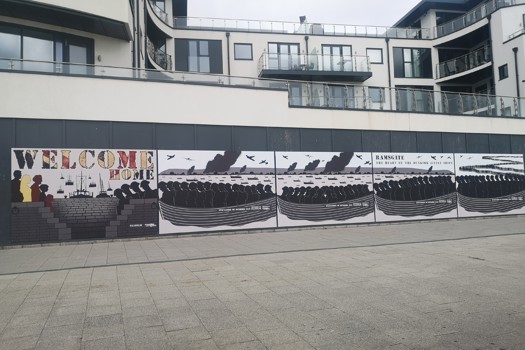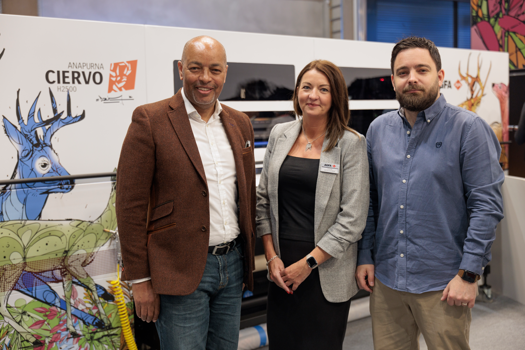It’s a philosophy that has paid off handsomely for the business, which today prints a wide range of products – from business cards, through PVC banners and hardback books – for clients that stretch the gamut from individual students all the way up to large corporations.
Over the past five years or so one of the key areas of investment focus for City Printing has been finishing. The company has done bits and pieces of finishing over the years – folding, guillotining and laminating – but more recently it’s started to bring more finishing work in-house, to the extent that today it has an armoury of kit that allows it to handle most jobs.
The most recent addition to City Printing’s finishing department is the DigiBook 200 – a PUR binder it bought from Morgana Systems last year, which launched at Ipex 2014.
“We had been using a machine that we got as part of a deal on something else and that was slowly dying so we upgraded to one from Encore Machinery,” says Sophie Pearson, operations director at City Printing. “Encore are wonderful and we really like them as a company, but the original machine was a bit more of a hand finishing job and didn’t have the levels of automation we were looking for.”
So the company looked at a few different options in the market, but once they’d seen what the Morgana machine could do there was no turning back.
“We went to see it in action and we looked at the Duplo one, but we really like and trust Paul Williams at Morgana so that was where we bought it from in the end,” says Pearson.
The two key things that particularly won City Printing over were the level of service offered by Morgana and the fact that the machine was so easy to use.
“Morgana equipment is set up so that pretty much anyone can use it with a bit of training,” says Pearson. “That meant all of our staff could jump on the machine and we didn’t have to just rely on one person who could use it.”
Speedy setups
The DigiBook has a touchscreen panel and icon graphics so that jobs can be set up in a few seconds – it also automatically measures the book thickness, which means it can be ready for production quickly.
A further attraction is the applicator can be cleaned and sealed automatically from the touchscreen which reduces glue wastage. The PUR glue is applied on the spine and sides of the book by independently adjustable glue slots to deliver accurate results. The height of the applicator and the pressure applied determines the quantity of glue used and allows the book to be bound swiftly and easily.
The DigiBook is targeted at “traditional and digital printers who require short or medium-length runs of PUR perfect-bound books to a professional standard,” according to Morgana. It has a top speed of 200 books per hour, but the beauty of it is its flexibility, according to Pearson.
“It allows us to do one-off or two-off books, because it only takes 20 minutes to heat up and five minutes to clean down, but it has a top speed of 200 books an hour so that means if we’ve got 1,000 books to do in different lots we can still do it in a couple of days, whereas before we would have had to send that out,” she says.
The machine has already found favour with a wide range of the company’s customers. “We’re doing a lot more student dissertation work because we’ve got a couple of universities next to us,” says Pearson. “We’re also doing a lot of our magazine work on it. Historically this was always done fold, stitch, trim, but once people started seeing we could do this on the PUR binder and it held together nicely and looked a lot better, a lot of our customers moved over to that.”
As well as successfully moving existing customers across to PUR binding from other finishing methods, the DigiBook has also generated a new revenue stream of income for the company, with City Printing taking on trade binding jobs for a number of local printers.
Since installation the machine has been kept busy and Pearson says it’s more than delivered on the manufacturer’s pre-sale promises, although its location in what she fondly refers to as ‘the dungeon’ – the company’s below ground finishing area – did initially cause a few problems.
“We did have some issues because our dungeon is quite damp and that was causing the glue to dry too quickly, but Morgana organised a couple of dehumidifiers for us and it’s been fine since,” says Pearson.
With regard the damp issues that the company encountered, Paul Williams, UK sales manager for Morgana, says: “As Sophie points out, the DigiBook 200 at City Printing is installed in the ‘dungeon’, an extremely damp environment. Whilst this causes no issues with the hermetically sealed tank system, or when producing a production run, when the machine was left for long periods in standby mode, the temperature of the glue, both in the pre-melter and the slot applicator, is automatically reduced. With the excessive moisture in the air, it was causing the glue to start curing. However, due the location of the machine, the DigiBook was the only solution suitable for this environment.”
Other than the minor issue with the dampness of the building interfering with the machine’s smooth running, Pearson struggles to find fault with the DigiBook. She says that she would love future iterations of the model to be able to handle landscape A3, but other than that she’s a happy customer – Williams points out that the next model up in the range, the DigiBook 300, is capable of producing an A3 landscape finished book and that there “is an upgrade path for all our of customers should their productivity or work applications change”.
Everything included
Pearson also doesn’t have a harsh word to say about the level of service the company has received from Morgana. “For the first year you get everything included and that worked out very well for us, but we also signed up for their five-star service package and we had a call out this week,” she says. “The engineer who came in couldn’t fix it, so the next morning, at 7am, Morgana sent a specialist in with some modified parts and it was mended really quickly.”
As a result she wouldn’t hesitate to recommend the machine, and indeed Morgana, to other printers looking to dip their toe into PUR binding. “If you are striking out into that market its perfect,” says Pearson. “The 200 is brilliant and if we needed to we would move on to one of Morgana’s bigger machines. The DigiBook has already boosted our turnover because we’re not outsourcing jobs and we’re also able to do trade work in-house, which we weren’t able to do before, so we now work with other printers who just send their stuff over to us.”
She’s currently considering buying something else from Morgana, which would sit alongside the DigiBook and the new Ricoh 9100 press that the company recently installed as part of a wider investment strategy.
“As a business we’re doing alright at the moment,” says Pearson. “We obviously struggled a bit the same as everyone else did during the recession, but over the last few years work has picked back up. We’re having a new website built, we’re doing a new SEO campaign and we’ve expanded our presses so that we can run a lot more work and hopefully a lot more brochures that are perfect bound will come out of that.”
SPECIFICATIONS
Max book size 380x320mm
Min book size 120x110mm
Spine thickness range 2-50mm
Cover weight 120-400gsm
Max speed 200 books per hour
Price £24,990
Contact Morgana Systems 01908 608888 www.morgana.co.uk
Company profile
City Printing was founded in 1976 in Hornsey Road, London N7, and is a family-run business. It offers full graphic design, print and marketing services to a wide range of different customers – from large organisations, through to small businesses, charities, members of the public and students. The company operates a mix of Xerox, Ricoh and OKI engines and employs a team of 10 people.
Why was it bought...
To replace an existing machine that needed a lot of manual intervention. The company also wanted to be able to tap into a new revenue stream by allowing the much faster more automated machine to be used by other printing companies for trade work.
How has it performed...
Better than expected. It’s enabled City Printing to generate money from taking on trade jobs for other printers and it allows the company to do more finishing work in-house. “The best thing about the machine is its ability to do a one book job or 1,000 books because that means we can hit the student market and all of the big corporates without having to outsource work,” says Pearson.










